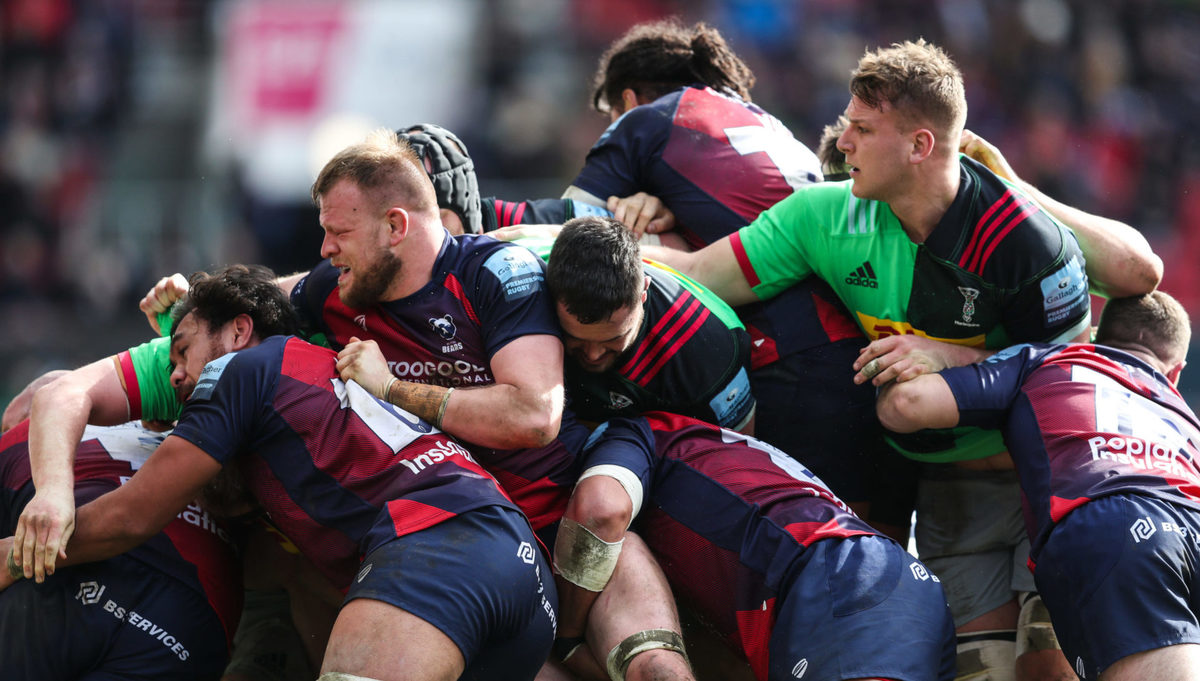'My parents rang worried': It's now a year since the last Bristol vs Harlequins Ashton Gate clash was followed by lockdown

This weekend’s Gallagher Premiership fixture list contains a throwback to the final day of the ‘old normal’, life as it used to regularly be last year before the pandemic struck. The Pat Lam-coached Bristol and the Adam Jones-assisted Harlequins played in front of 14,618 people at Ashton Gate in the final March 2020 match before the shutters came crashing down in English rugby. Fifty-four weeks later comes the rematch: same ground, same teams but a very different atmosphere.
This ‘new normal’ of never-ending Covid testing and empty stadiums will never feel right but just now it’s a case of needs must for Bristol boss Lam. Best smile, best foot forward, cope with the adversity and just get on with it. That’s not to say you’re not allowed to have your bad days. You very much are and Lam has had plenty himself.
It’s just you find a way to adapt and just over a year since life rapidly changed for the worse, Lam has now reflected on an ordeal no-one could ever have imagined the world having to endure. “It was massive for everyone,” he said, acknowledging the one-year anniversary of the pandemic and its brutal impact on Premiership rugby.
“We all know the impact that Covid has had. But like anything, whether it is a game or life, I am always, ‘What is positive about this?’ I said at the time about the extreme of shared ownership – and you couldn’t get more extreme than that, a lockdown and guys having to own their development, own their growth. Everybody had to do that.
“One of the things that have been very good out of this is, like life again, you face a challenge, have a plan, communicate the plan, everyone agrees on it and we work to it. That is translated into our games where we have a bit of adversity – ‘Right, what is our plan? Let’s all work together and let’s get through it’. That’s just life, rugby, everything, so it’s a positive in that sense.
The hooker from Leinster is typical of the punt Bristol boss Pat Lam likes to take on unheralded players whose talents are undervalued elsewhere #PremRugbyhttps://t.co/jlMqC0MnMj
— RugbyPass (@RugbyPass) March 25, 2021
“I got asked on BT after last weekend game it’s a long season, lots of games, are the boys feeling tired and I said it’s an attitude. As I have always said, there are two types of jobs in the world: there are the jobs that you have to do and the jobs that you love to do,” continued Lam, who first came to Bristol in 2017 after being in Ireland with Connacht.
“I always ask this to the guys, what is rugby – getting paid to play rugby or to work in the rugby? Everyone says they love it and I say let’s remember that because there is going to be tough times and let’s remember this is what we love and that is why the majority in here all have a pretty positive attitude.
“I have bad days but when I come in and everyone is saying good morning and it’s a big day, that lifts everyone and that is an important part of what we need in society. That is why I don’t watch the news too much.
“My parents rang me the other day, FaceTimed worried and said, ‘Are ye guys alright?’ I said, ‘Why?’ They said, ‘What’s happened in Bristol? There are protests’. I said, ‘Really?’ I didn’t know anything about it. So I went on the internet and I was, ‘Geez, that happened’. If I was locked into it I would be, ‘Geez, this is bad news’, but I was more focused on our rugby.”
Jones was a kindred spirit of Lam that Ashton Gate Sunday 54 weeks ago, an assistant coach of Harlequins who didn’t realise when the full-time whistle blew to give Bristol the win that the world would have utterly changed by the time the Londoners got back on the pitch again five months later. “It’s a year now and we realise how lucky we are,” he said.
“You can put up with the empty stadiums because you’re still playing, still getting to see your mates every day and training. You get a swab shoved up your nose a couple of times a week and down your throat, that is the least of your worries. I have realised how lucky we are the fact we can still do our job. It has been massive. The rest of the world have had far worse than us.
“It was mad (when rugby stopped). It was new, nothing like this had happened before and you didn’t quite know how bad it was going to be. It was, ‘It won’t be too long now’. Then it was, ‘Oh s***, it’s going to be a bit longer’.
“To get us back in pre-season for July, that gave us something to go for, but the way it was looking for that first lockdown there was no light at the end of the tunnel and there was only so much reading books that you could do. To be able to come back in we are lucky buggers to do it… it has been a tough year but not as half as tough for some people.”
"The amount of s*** they were having in the autumn, how crap Wales were. I’m thinking well, we’re not that crap" https://t.co/5FqgcjH2Ye
— RugbyPass (@RugbyPass) March 23, 2021





























